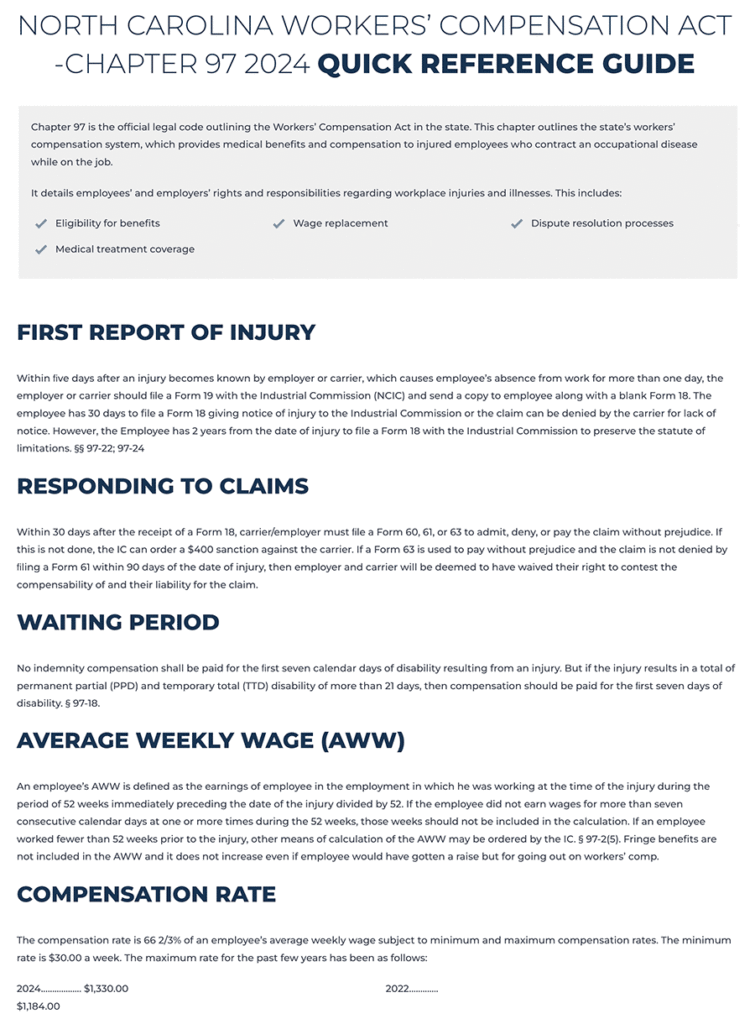Do you know your rights under North Carolina’s workers’ compensation laws?
When it comes to workers’ compensation, there is a lot of misinformation, myths and misconceptions out there that confuse everyday folks who aren’t sure whether or not they are covered. Some of these misunderstandings are intentionally promoted by dishonest employers and insurance companies who benefit when injured individuals fail to fully understand (and pursue) their legal rights.
To help clear the confusion and set the record straight, let’s start by explaining who is entitled to workers’ compensation in North Carolina:
This is true regardless of your immigration status.
In this article, we will make you aware of your rights under the North Carolina Workers’ Compensation Act and to give some general advice as to what to do if you are injured on the job.
Your duties and responsibilities after a work-related accident, injury or illness
1. Notify your employer
The first thing to do if you are injured at work or diagnosed with an occupational illness is to immediately notify your company. The law says that you have up to 1 month to report any job-related injury to your company. However, the sooner you can notify your company, the better.
The best way to give notice is in writing. Be sure to keep a copy of your written notice because it will help you prove your case. Your written notice should include the day of the accident, the time of the accident, a small description of the accident, and a list of what parts of your body you hurt. It does not have to be a formal letter. Writing a short note will satisfy the notice requirement.
If your injury prevents you from giving written notice, have a friend or coworker tell your employer what happened, and that you will give written notice as soon as you are able to do so. It’s also a good idea to tell your coworkers what happened in case your supervisor denies receiving notice of your claim.
2. File your claim with the Industrial Commission
Ask your employer to provide a Form 18 Notice of Accident to Employer (or you can print it out yourself here). This form must be filed with the North Carolina Industrial Commission within 2 years from the date of your injury. If you do not file this form within 2 years, you may be disqualified from receiving workers’ compensation benefits.
You can contact a friend, an attorney, or the North Carolina Industrial Commission for help filling out this form.
Help! I was injured at work. What are my rights?
YOUR RIGHT to workers’ compensation regardless of immigration status
We believe it is important to further emphasize the following point:
The workers’ compensation insurance company is not allowed to ask about your immigration status. Although your employer can fire you if the company discovers you are undocumented, the workers’ compensation carrier cannot deny your claim based on your immigration status if you get hurt at work.
If you are medically unable to return to work, the insurance company must continue to pay your time out of work, even if you are undocumented.
YOUR RIGHT to benefits even if you get paid in cash
A lot of companies pay their workers “under the table” and in cash. It’s important to understand that you still may be entitled to workers’ compensation benefits if you are paid in cash. However, it will be your burden to show how much you were earning before your injury in order to calculate your average weekly wage.
It is a good idea to keep a weekly log of how much you are paid, including overtime. You should receive time and a half for every hour worked over 40 hours per week. The insurance company must take into account overtime when calculating your weekly benefits.
Your weekly benefits are calculated by averaging your weekly wages in the 1 year before your injury. You should receive two-thirds of this amount for any week that you miss work due to your injury. Workers’ compensation benefits are not taxed, so the two-thirds wages is roughly your after-tax weekly earnings. This is called your “compensation rate” and must be paid to you for the time you miss work due to your injury.
The first week you miss work due to your injury is considered to be a waiting period. You do not get reimbursed for that week unless you are out of work for more than 21 days. Only if you are out of work for more than 21 days will you get reimbursed for the first week. (For example, if you are only out of work for 2 weeks, then you do not get paid for the first week but will get paid for the second week.)
YOUR RIGHT to refuse an employer’s offer to pay outside of workers’ comp
Do not accept an offer from your company to pay for your medical treatment instead of submitting a claim to the workers’ compensation carrier. Many times, a small employer may offer to pay for you to go to the doctor and even pay a couple of days of missed work in return for you not making a claim. This is never a good idea because you are entitled to certain benefits under the Act in addition to medical care and wage replacement.
For example, if you break your leg at work and file a workers’ compensation claim, then you can get payment for your medical treatment, time out of work, and a cash payment for the disability rating you may receive at the end of your case.
YOUR RIGHT to transportation assistance, a translator and travel reimbursement
The insurance company must provide transportation to and from doctor’s appointments if you are unable to drive yourself. The insurance company must also provide an interpreter if the doctor’s office does not have anybody on staff who speaks your language.
If your doctor’s appointment is more than 10 miles away from your home, you are entitled to mileage reimbursement at the rate of $0.31 per mile.
YOUR RIGHT to choose your doctor
You are entitled to see your own doctor for a second opinion. If the insurance company accepts your claim, it gets to direct your medical treatment. However, if you are unhappy with the treatment you are receiving, you can request a change of physician to your own doctor.
At the end of your treatment period, the doctor may issue a “permanent partial disability rating” to the part of your body that was injured. The higher the rating, the more money your injury is worth. If the insurance company’s doctor gives you a low rating, you are always entitled to a second opinion on this rating with a doctor of your choice.
YOUR RIGHT to continue medical treatment
You are entitled to medical treatment for up to 2 years after the doctor releases you from treatment. Once the insurance company pays your rating, you have 2 years to see the doctor for your injury. For example, if you see the doctor 6 months after you have been released, the 2-year clock starts again from the date of your last medical appointment.
As long as you are seeing the doctor at least once every 2 years, you should be entitled to medical benefits for as long as you need to see a doctor for your work-related injury.
YOUR RIGHT to settle your claim and resign
Instead of electing to take continuing medical treatment for 2 years after the doctor releases you, you can settle your claim on a “clincher agreement.” The insurance company likes to close its file at the end of a case. If you are willing to look for a different job, the insurance company may pay you a premium for settling your case.
This settlement should take into account the cost of any future medical treatment, your rating, and a period of time for you to find a job within your restrictions if you agree to close your case. The advantage is that you get more money in your pocket for the claim. The disadvantage is that you are now responsible for your own medical treatment and for finding a new job.
The insurance company is usually only willing to settle a claim this way if there is no longer any work available for you at your old job, or if you are willing to resign from your old job.
YOUR RIGHT to hire a workers’ compensation attorney
If you are going to hire an attorney, it is best to do so in the beginning stages of your claim. As soon as a claim is reported to the insurance company, an insurance adjuster will call you to take your “recorded statement.” This is a recorded telephone conversation that is used by the insurance company to make a decision whether to accept or deny your claim. It is helpful if you have an attorney present at this telephone conference to assist you and discuss the merits of your case.
An attorney can also assist with obtaining weekly benefit payments, arranging doctors’ appointments, and communicating with the insurance company. Your attorney can be a big help when it comes time to return to work. If there is not work available at your old job within your restrictions, the insurance company must help you find a job that earns roughly the same amount of money and fits within your physical limitations. Your attorney can make sure that the insurance company does not try to send you back to a job that is unsuitable for your age, physical limitations, education, salary, and experience.
How much does a workers’ comp lawyer cost?
All workers’ compensation cases are taken on a “contingency fee” basis. This means that you pay no money upfront for your lawyer. Instead, your lawyer will take his or her fee as a percentage of your settlement.
You are still responsible for any costs associated with obtaining the settlement or award, such as the fees for gathering your medical records. These costs are in addition to the percentage fee, but these costs do not have to be paid upfront. Rather, they will generally be reimbursed to the attorney out of the settlement proceeds.
YOUR RIGHT to dispute a claim denial
You still have rights if your workers’ compensation claim is denied. The insurance company must make a decision within 2 weeks of having received notice of your claim if it is going to accept or deny your claim. (In some cases, the insurer will file a conditional acceptance if it needs more time to investigate the claim.)
If the insurance company denies your claim, it is wise to hire an attorney to determine if there are grounds for filing an appeal of the denial. If your case has merit, the attorney will file a request for hearing with the Industrial Commission. This is a formal lawsuit against your company and its workers’ compensation carrier.
Leading up to the hearing, your attorney will gather evidence and respond to questions from the insurance company’s lawyer. Once the insurance company’s lawyer has reviewed your medical records and other information about your claim, your lawyer will schedule “mediation.”
Mediation is a time for you, your lawyer, and the insurance company’s lawyer to discuss your case with a neutral mediator. Mediation is not a trial and you do not have to do any speaking; it is simply a way for your lawyer to explain to the other side why you feel your injury should be paid.

Chapter 97 is the official legal code outlining the Workers’ Compensation Act in the state. It details employees’ and employers’ rights and responsibilities regarding workplace injuries and illnesses. This includes:
- Eligibility for benefits
- Medical treatment coverage
- Wage replacement
- Dispute resolution processes
Talk to an experienced North Carolina attorney about your workers’ compensation rights
It is always a stressful time when you get hurt at work. In addition to dealing with the physical injuries and your employer, you must also deal with the insurance company, doctors’ offices, nurse case managers, and the workers’ compensation system.
Knowing your rights is half the battle.
It is always a good idea to consult with a workers’ compensation attorney near you to obtain advice on your individual case. If you were hurt on the job in North Carolina, don’t hesitate to contact our Charlotte workers’ compensation attorneys to discuss your rights.
How To Spot a Bad Workers’ Compensation Lawyer
Learn how to identify the signs of a bad workers’ comp lawyer so you can get the representation you deserve and secure your rightful compensation.



